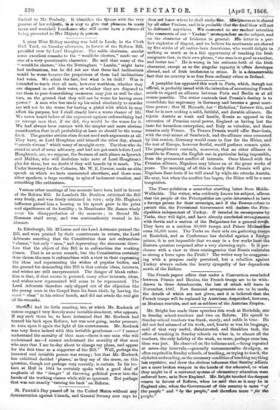In Edinburgh, Mr. bilLaren and the Lord Advocate praised the
Bill, and were praised by their constituents in return, the Lord Advocate asserting that the Constitution does not enfranchise "classes," but only "men," and deprecating the statement there- fore that the object of this Bill is to enfranchise the working classes. That is an acute remark, but the Constitution certainly does choose the men it enfranchises with a view to their expressing the ideas and representing the wishes of popular bodies, and the ground for demanding this Bill is that certain ideas, interests, and wishes are still anrepresented. The danger of blank reduc- tion is that, if that course is pursued, many other interests, ideas, and wishes now represented will cease to be represented. The Lord Advocate therefore only slipped out of the objection like the young man in the Gospel from his linen cloth, by leaving the word" class " in his critics' hands, and did not evade the real gist of the remarks.






























 Previous page
Previous page